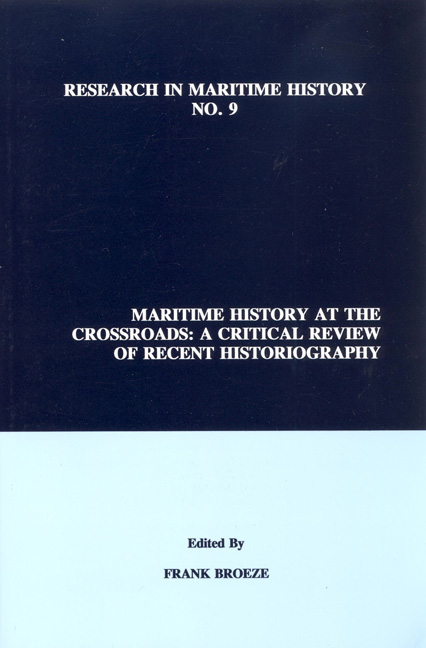Book contents
- Frontmatter
- Contents
- About the Editor
- Introduction
- Contributors
- “Maritime History in Australia”
- “The Enterprising Canadians: An Assessment of Canadian Maritime History since 1975”
- “The Historiography of Maritime China since c. 1975”
- “Danish Maritime History, 1976-1992: A Review”
- “German Maritime Historical Research since 1970: A Critical Survey”
- “The Maritime Historiography of Greece in Recent Decades”
- “Ibero-American Maritime History: Recent Advances in Research, 1975-1994”
- “Indian Maritime Historiography: West Coast Merchants in a Globalizing Economy”
- “Recent Developments in the Historiography of Maritime History in the Netherlands”
- “The Ottoman Empire: Recent Research on Shipping and Shipbuilding in the Sixteenth to Nineteenth Centuries”
- “The Progress of Maritime History in Spain since 1975”
- “Oceanic Historiography: The American Dimension”
“German Maritime Historical Research since 1970: A Critical Survey”
from Contributors
- Frontmatter
- Contents
- About the Editor
- Introduction
- Contributors
- “Maritime History in Australia”
- “The Enterprising Canadians: An Assessment of Canadian Maritime History since 1975”
- “The Historiography of Maritime China since c. 1975”
- “Danish Maritime History, 1976-1992: A Review”
- “German Maritime Historical Research since 1970: A Critical Survey”
- “The Maritime Historiography of Greece in Recent Decades”
- “Ibero-American Maritime History: Recent Advances in Research, 1975-1994”
- “Indian Maritime Historiography: West Coast Merchants in a Globalizing Economy”
- “Recent Developments in the Historiography of Maritime History in the Netherlands”
- “The Ottoman Empire: Recent Research on Shipping and Shipbuilding in the Sixteenth to Nineteenth Centuries”
- “The Progress of Maritime History in Spain since 1975”
- “Oceanic Historiography: The American Dimension”
Summary
Maritime history (Schiffahrtsgeschichte) has been defined on several occasions in recent years. The late Professor Ralph Davis observed that “[t]he history of merchant shipping of all kinds as distinct from naval history, has recently taken the term maritime history to itself and given it a more restricted meaning.” He added that it “embraces a range of topics.. .in scientific and technological, economic and social, political and cultural history,” thus including a wider range of themes than he actually wanted. Since then maritime historians have favoured an even broader definition, even considering items “tangentially related” to man's activities at sea, as David Williams and Andrew White did in their introduction to a bibliography of British and Irish university theses:
In maritime history such topics abound - for example, historical studies of sea-borne trade or of commercial, diplomatic or military relations between maritime nations. All have a clear bearing on maritime activity, although their specific shipping or maritime content may be limited. This is the case with general histories of coastal towns or of industries - in particular mining and quarrying - in which development was conditional on access to sea transport.
While being pulled in many new directions, maritime history has also begun to overcome local, regional and national constraints. The editors of the International Journal of Maritime History (IJMH) argued that the international dimension must be taken seriously if the quality of maritime writing is to improve. The IJMH is an ideal platform for maritime historians to present their research to a global audience and to seek a dialogue with international scholars. Maritime history need not be on the fringes of the larger profession, but in order to make it more central its potentials need to be pursued more vigorously.
By international standards German maritime history is still in its infancy as an academic subject. No German university offers a regular course on the subject and occasional seminars in Hamburg or Hannover are not integrated into the syllabus. Instead, maritime topics are treated as exotic in an academic milieu which has never emphasised the marine dimension of Germany's past.
- Type
- Chapter
- Information
- Maritime History at the CrossroadsA Critical Review of Recent Historiography, pp. 113 - 134Publisher: Liverpool University PressPrint publication year: 1995



